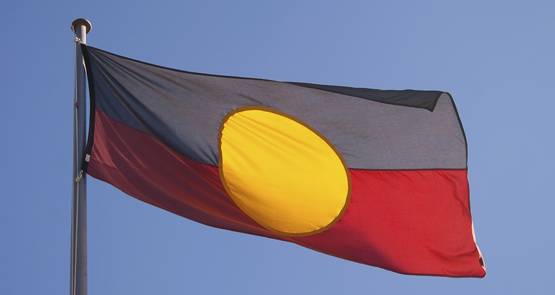
The bipartisan acceptance of the term “invasion” by Malcolm Turnbull and Bill Shorten happened in one of the most heightened places of political sensitivity, the final weeks of an election campaign. Their position marked a coming of age in Australian politics and the end of the history wars.
Opposition Leader Bill Shorten’s response to Tony Jones’ prodding on Q&A about whether he would discuss the idea of treaty after a successful referendum on constitutional recognition showed the sort of courage, stature and maturity that hasn’t been witnessed from Australian political leaders in indigenous affairs for perhaps a generation.
Kevin Rudd’s apology speech was poetic and courageous to a degree, but he sadly batted off claims for a reparations settlement with members of the Stolen Generations on the premise it would represent political poison.
[Rudd says much more than just sorry]
One might ask why Paul Keating didn’t approach a thorough political settlement with indigenous peoples when he negotiated a settlement after the ground-breaking Mabo case. The intense negotiations that happened at this time led to the creation of the Native Title Act 1993 and the Indigenous Land Account, in recognition of the fact that the native title rights of the majority of indigenous Australians had most likely been extinguished according to these new laws.
Paul Keating, speaking about this significant settlement in 2011, said that for the “first time, … Aboriginal people were brought fully and in an equal way to the centre of national executive power.”
At the time, Keating negotiated with the head of the Aboriginal and Torres Strait Islander Social Justice Commission, and representatives of major indigenous land councils. Today, those land councils still exist and there is the National Congress of Australia’s First Peoples, which is arguing that a relationship built on an agreement-making framework needs to come before constitutional recognition.
At the time of the post-Mabo negotiations, the Keating government side would have been doing everything in its power to reduce the ambits of the indigenous negotiators’ claims, not amplify them. Keating’s failure to embrace a treaty at that time was a missed opportunity. The reality remains, however, that some reparations have been made through various mechanisms and agreements with indigenous peoples.
No doubt any current government would cite these examples in any new negotiation . The most aching deficit left by the absence of a treaty is a political, moral and legal one. The disempowerment inculcated at every level of society, in every institution, in every conversation that positions indigenous peoples as an “issue”, or people of “deficit”, will continue indefinitely without a “reset” of the relationship.
As non-Indigenous people, our own sense of legitimacy and national identity is made frail, thwarted, destabilised by this lack of agreement. That reset cannot occur without a clear articulation of the political, moral and legal relations between the Australian executive government and indigenous peoples.
No doubt such a negotiation would be fraught, with detractors from every side. Canada and New Zealand’s treaties with their indigenous peoples were negotiated hundreds of years ago before the 24-hour news cycle. But it has to come. We cannot afford to not move forward. Politically, indigenous bodies like the National Congress need to find every ledge they can in the rock-face to climb this mountain.
Constitutional recognition is the first ledge that has bipartisan backing and can open the way for mature discussion about issues that could be mediated by a treaty. If harnessed well, constitutional recognition could become a force of momentum to broaden and elevate the conversation that our country desperately needs to have.
[What is the point of indigenous recognition?]
The fact that our two leaders were able to swiftly deal with the invasion question tells us that the panic merchants are running a declining side act, and there is more than enough good will, honesty and decency to get us to a position that all Australians can feel proud of.
It might not all be politically possible for some time, but if politics is the art of the possible, then the art of expanding the realms of possibility needs to become the focus of all campaigners. A growth mindset, rather than a fixed mindset, is what Bill Shorten demonstrated the other night, and this sort of calm leadership and open thinking needs to be encouraged.







I agree with you Rita that a treaty settlement process in Australia is both politically possible and inevitable in the longer term in the national interest. Note though that what has happened in Canada and NZ is not due to negotiations ‘hundreds of years ago’. In Canada most treaties and comprehensive settlements have occurred in the 21st century after key legal cases in Calder and Sparrow and the ‘patriation’ of the Canadian constitution in 1982. Most of Canada was not covered by old Treaties signed between the 1870 and 1920s hence the need for modern treaties with First Nations that include self government options. Similarly in NZ while the Treaty of Waitangi was signed in 1840, the modern treaty settlement process between iwi (tribes) and the Crown is largely a late 20th and early 21st century phenomenon.
Thanks Jon for elaborating on this point in an important way. While the treaty process started a few century ago in those countries, you’re right that important constitutionally recognised rights (like section 35 of the Canadian Constitution) were established as a result of more recent campaigner activity. So it cannot be viewed as old history only. However I would argue that the dynamics and character of the political debate in Canada in the early 1980s was different to the type of debate we’ve had in Australia because of the fact that some treaties had already been entered into, giving First Nations peoples a more solid starting position. No doubt this is what National Congress has in the back of their mind with their current position on Constitutional Recognition (treaty first, recognition second).